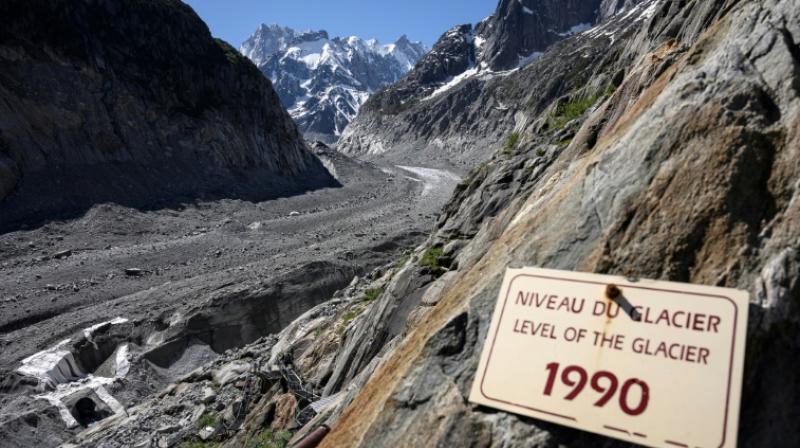Legendary Alpine climb comes to halt due to climate change

Mont Blanc: High up in the natural wonder of the French Alps, the climbers who spend their days among the rockfaces and glaciers have come to a grim conclusion: the mountains are falling down around them. In the Mont Blanc range, a magnet for mountaineers in the summer, many popular routes up or through the peaks have become too dangerous to take because of the risk of falling debris.
"It's going quickly. Ten years ago, I'd have never thought that it would accelerate like this," said Ludovic Ravanel, an academic at the University of Savoie Mont Blanc who has been studying major rockfalls in the area.
"And if you look at the predictions from my climatologist colleagues, for the next 10 to 20 years, it's only going to get worse," he told AFP. In many areas of Western Europe, climate change is happening too slowly to be noticed, although two record-setting heat waves in June and July this summer, as well as water shortages, are focusing minds.
Around Mont Blanc, the warming has already left physical scars. In 2005, following a major heatwave two years earlier, a huge shard of granite called the Bonatti pillar suddenly collapsed, spewing 292,000 m3 of rock into the valley below and stunning the mountaineering community.
With it went a feature visible from the nearby resort town of Chamonix, as well as the dreams of many climbers hoping to take on a legendary challenge named after celebrated Italian mountaineer Walter Bonatti.
Major rockfalls on less famous routes continue regularly, without fanfare, and would go unnoticed were it not for the work of researchers like Ravanel who tracked them for his PhD. Occasionally, they register more widely in the climbing community, like a collapse on the Arete des Cosmiques ridge last summer that is often taken by beginners hoping to take on the 4,810-metre Mont-Blanc peak, the highest in western Europe.
"There's not much time left for certain rockfaces," warned 37-year-old Ravanel, whose father was a mountain guide. The reason is that permafrost -- the year-round ice found at high altitude -- is melting and with it the glue that binds together giant slabs of rock.
Retreating glaciers, which are melting under the effect of higher temperatures, are also leaving the peaks more vulnerable and less supported. Though erosion is a constant natural process and rockfall has been a danger since climbing began, the effects of climate change are believed by scientists to be speeding up the rate of attrition in the Alps.
Worries about the impact of shorter winters and hotter summers are commonplace in the ski businesses and mountain refuges where people depend on adventure sports for their livelihoods. At a high-altitude refuge called Couvercle above the Mer de Glace glacier, conversations among the 50 guides and climbers staying there for the night focused as usual on security.

